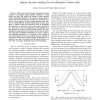Free Online Productivity Tools
i2Speak
i2Symbol
i2OCR
iTex2Img
iWeb2Print
iWeb2Shot
i2Type
iPdf2Split
iPdf2Merge
i2Bopomofo
i2Arabic
i2Style
i2Image
i2PDF
iLatex2Rtf
Sci2ools
120
click to vote
CDC
2010
IEEE
2010
IEEE
The role of social feedback in steady-state performance of human decision making for two-alternative choice tasks
With an eye towards design of human-in-the-loop systems, we investigate human decision making in a social context for tasks that require the human to make repeated choices among finite alternatives. We consider a human decision maker who receives feedback on his/her own performance as well as on the choices of others performing the same task. We use a drift-diffusion, decision-making model that has been fitted to human neural and behavioral data in sequential, two-alternative, forced-choice tasks and recently extended to the social context with an empirically derived feedback term that depends on choices of other decision makers. We show conditions for this model to be a Markov process, and we derive the steady-state probability distribution for choice sequences and individual performance as a function of the strength of the social feedback. It has recently been shown in behavioral experiments that human decision-making performance for a relatively easy task is decreased with this soci...
CDC 2010 | Control Systems | Feedback | Human | Human Decision |
| Added | 13 May 2011 |
| Updated | 13 May 2011 |
| Type | Journal |
| Year | 2010 |
| Where | CDC |
| Authors | Andrew Reed Stewart, Naomi Ehrich Leonard |
Comments (0)

